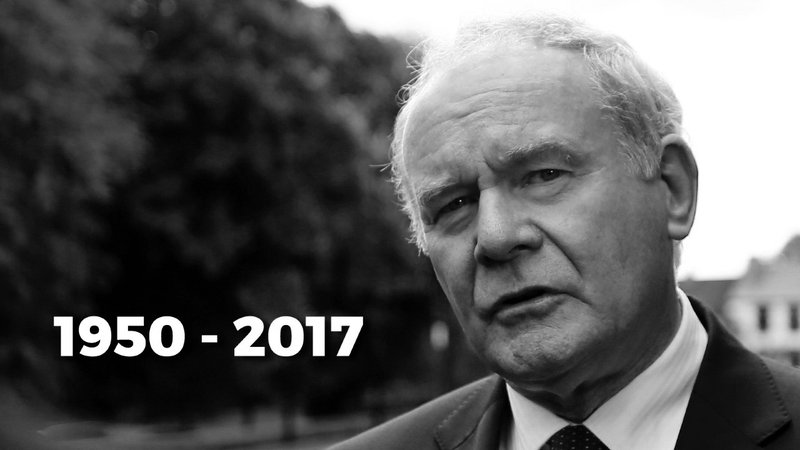Former Northern Ireland Deputy First Minister and former Irish Republic Army (IRA) chief-of-staff Martin McGuinness has died at the age of 66.
Mr McGuinness resigned as Deputy First Minister in January after a decade in the power sharing role with the Democratic Unionists which helped to end 30 years of conflict in the country.
A statement from his Sinn Fein party said he died today in Londonderry following a short illness.
He was diagnosed with a rare heart condition at the end of last year, and died in hospital in his hometown surrounded by his family.
Sinn Fein President Gerry Adams said: “Throughout his life Martin showed great determination, dignity and humility and it was no different during his short illness.
“He was a passionate republican who worked tirelessly for peace and reconciliation and for the re-unification of this country. But above all he loved his family and the people of Derry and he was immensely proud of both.”
Democratic Unionist Party (DUP) leader Arlene Foster said his death “will come as a shock to many people”.
She said: “History will record differing views and opinions on the role of Martin McGuinness played throughout the recent and not so recent past but history will also show that his contribution to the political and peace process was significant.”
Mr McGuinness’ resignation in January, which triggered a snap election, came after he gave Mrs Foster an ultimatum to step aside over the “cash for ash” energy scandal.
Ireland President Michael D Higgins said in a statement: “As President of Ireland, I wish to pay tribute to his immense contribution to the advancement of peace and reconciliation in Northern Ireland – a contribution which has rightly been recognised across all shades of opinion.”
Mr McGuinness helped to negotiate the 1998 Good Friday peace agreement, secured IRA arms decommissioning in 2005 and then shared government with unionist leader Reverend Ian Paisley as deputy first minister.
Prime Minister Theresa May said: “While I can never condone the path he took in the earlier part of his life, Martin McGuinness ultimately played a defining role in leading the republican movement away from violence.
“In doing so, he made an essential and historic contribution to the extraordinary journey of Northern Ireland from conflict to peace.”
In a statement, former Prime Minister Tony Blair said: “There will be some who cannot forget the bitter legacy of the war. And for those who lost loved ones in it that is completely understandable.
“But for those of us able finally to bring about the Northern Ireland peace agreement, we know we could never have done it without Martin’s leadership, courage and quiet insistence that the past should not define the future.”
Ulster Unionist leader Mike Nesbitt said: “I believe no-one needed to die to get Northern Ireland to where it is today.
“Clearly Martin McGuinness very actively disagreed with that analysis, but I also accept in his later years he was on a journey to create change through politics, becoming a pivotal figure at Stormont.”
Mr McGuinness was a former butcher who rose to become a commander in the IRA and promised to lead the republican movement to a united Ireland.
He did not join the IRA until after the British Army had been sent to Northern Ireland in August 1969 to restore order after a pitched battle between the RUC and people in his neighbourhood of Bogside.
Mr McGuinness was jailed for six months in the Republic of Ireland after being caught in a car containing large quantities of explosives and ammunition.
A teetotal, non-smoker who enjoyed Gaelic football, cricket and fishing, he said he left the IRA in 1974.
Other accounts suggest he was made chief of staff of the organisation in 1978 and streamlined it into an urban guerrilla force comprised of small cells.
But years later, in 2012, he was pictured shaking hands with and toasting the Queen in what he hoped would help define “a new relationship between Britain and Ireland and between the Irish people themselves”.
He is survived by his wife Bernie and four children.






